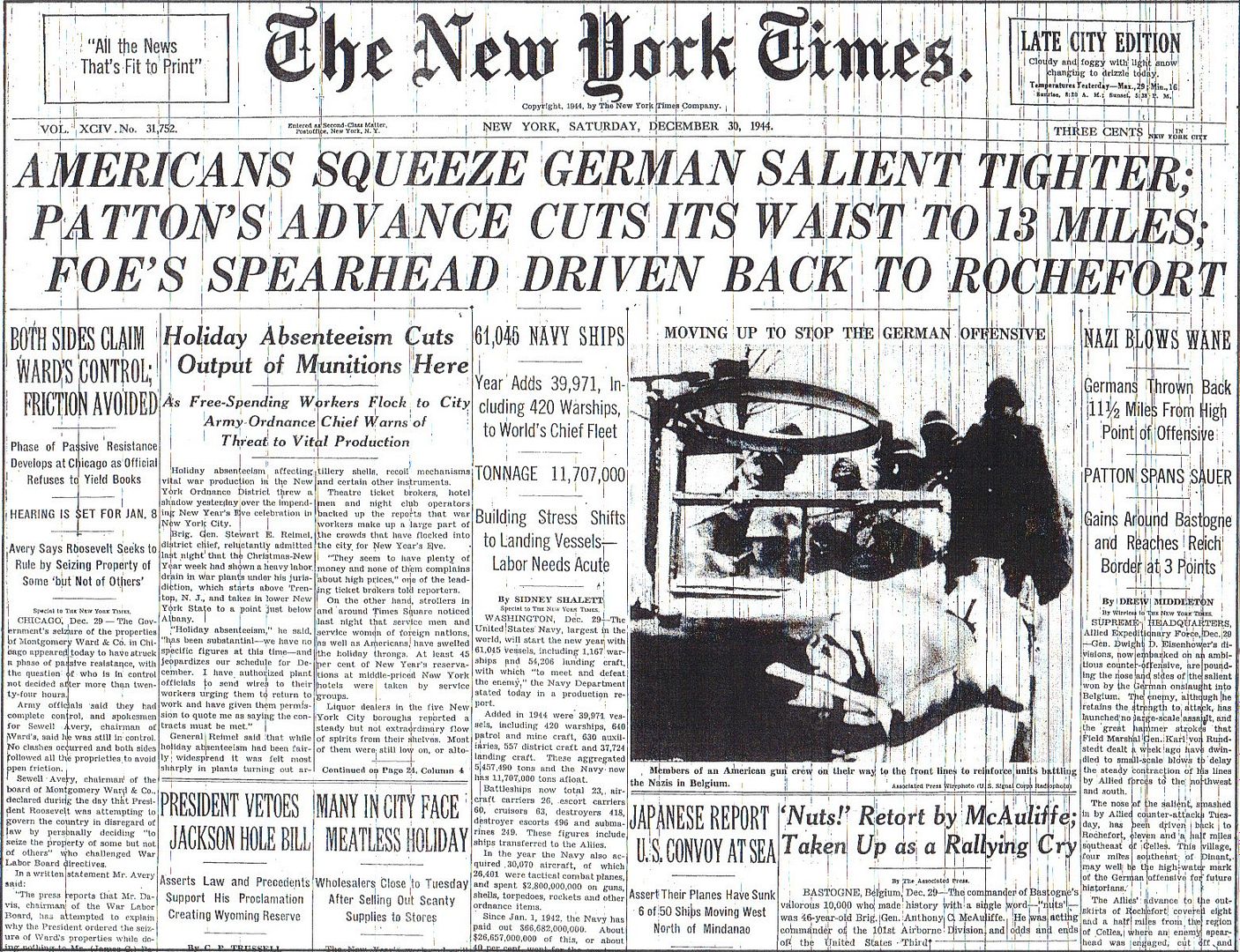
Posted on 12/30/2014 4:19:43 AM PST by Homer_J_Simpson

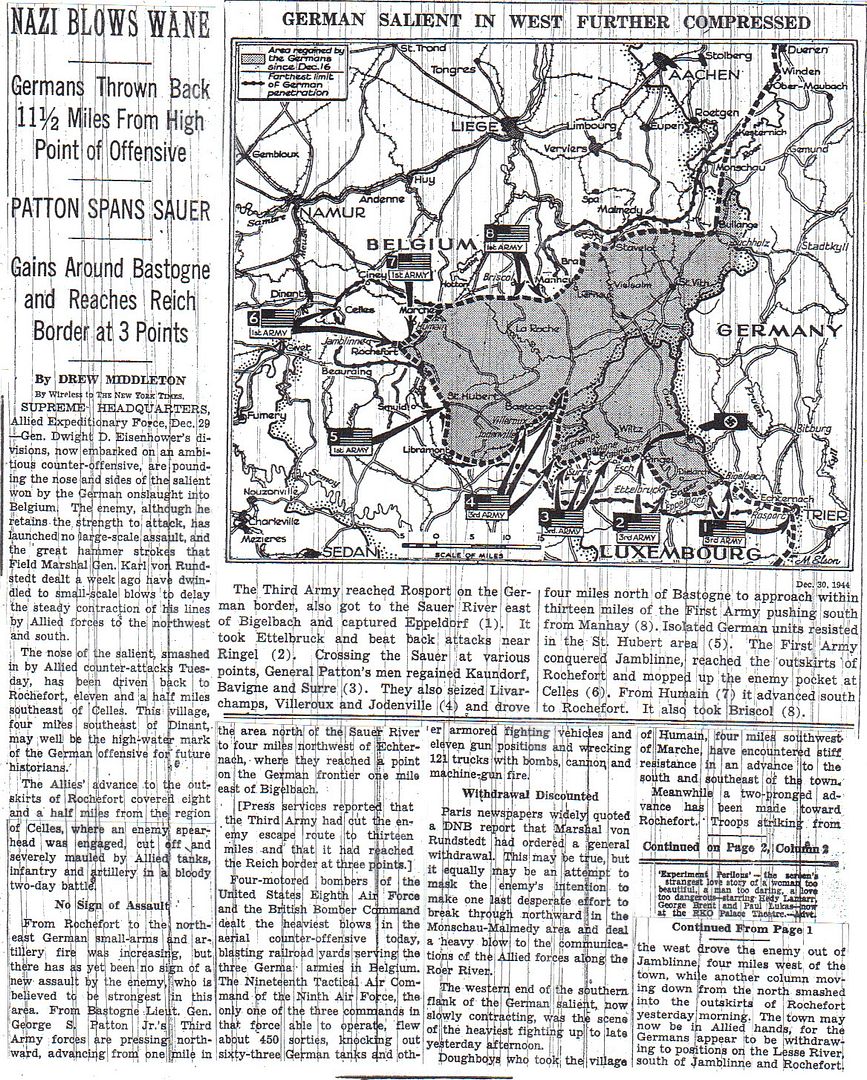
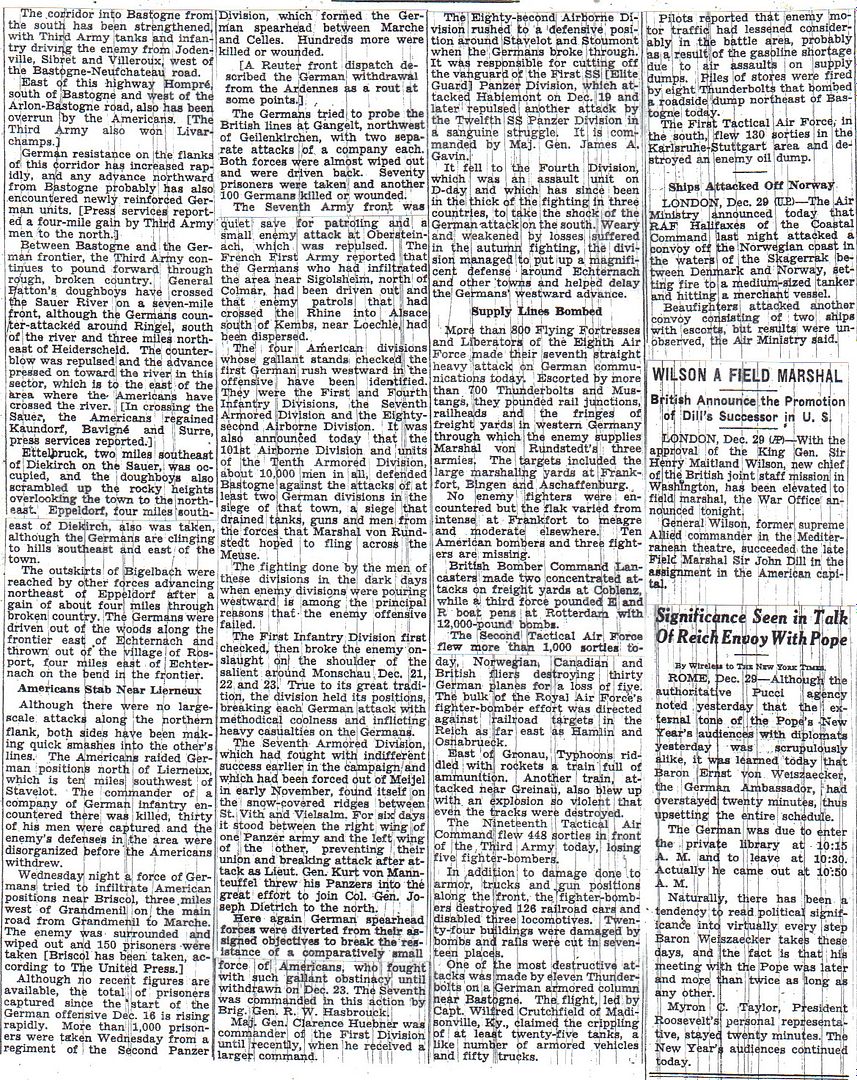
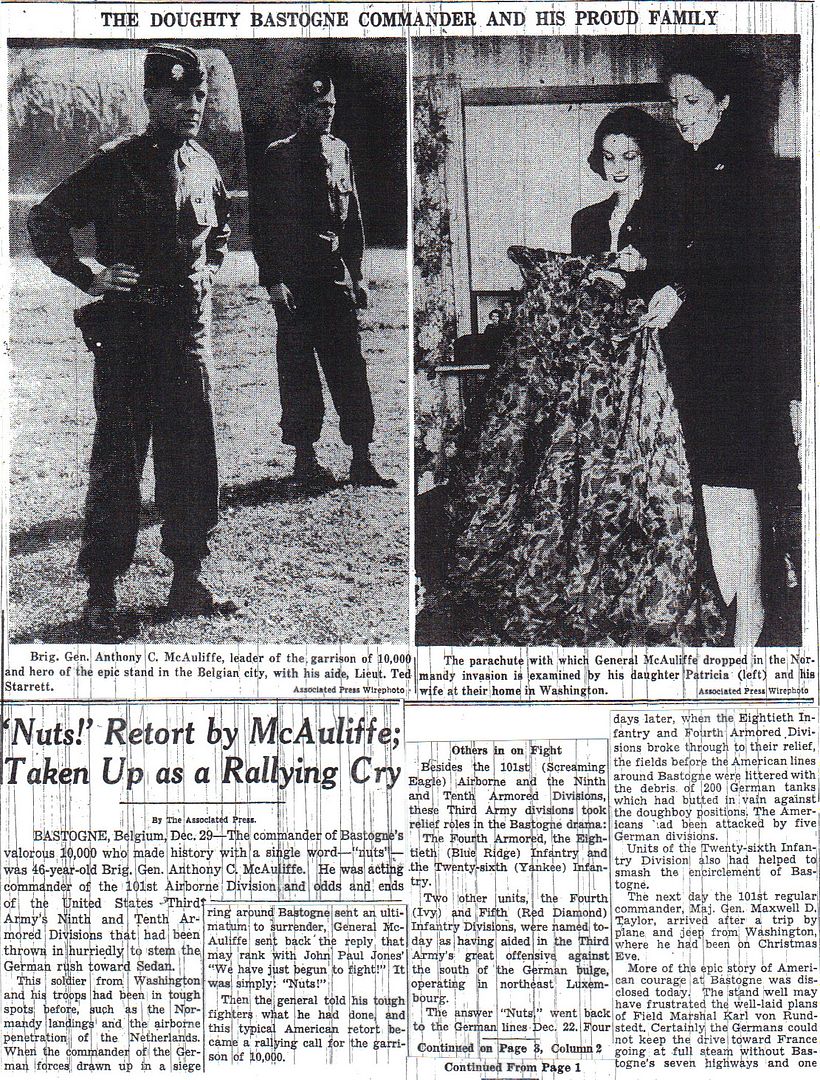
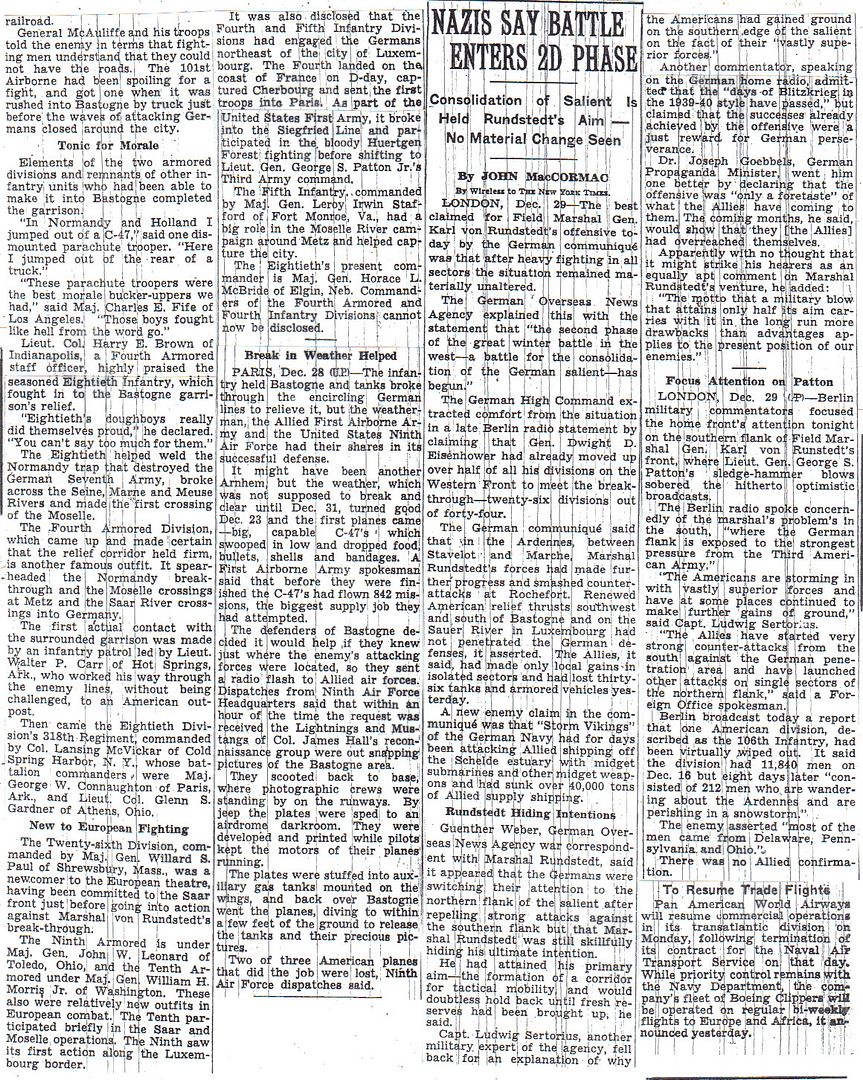
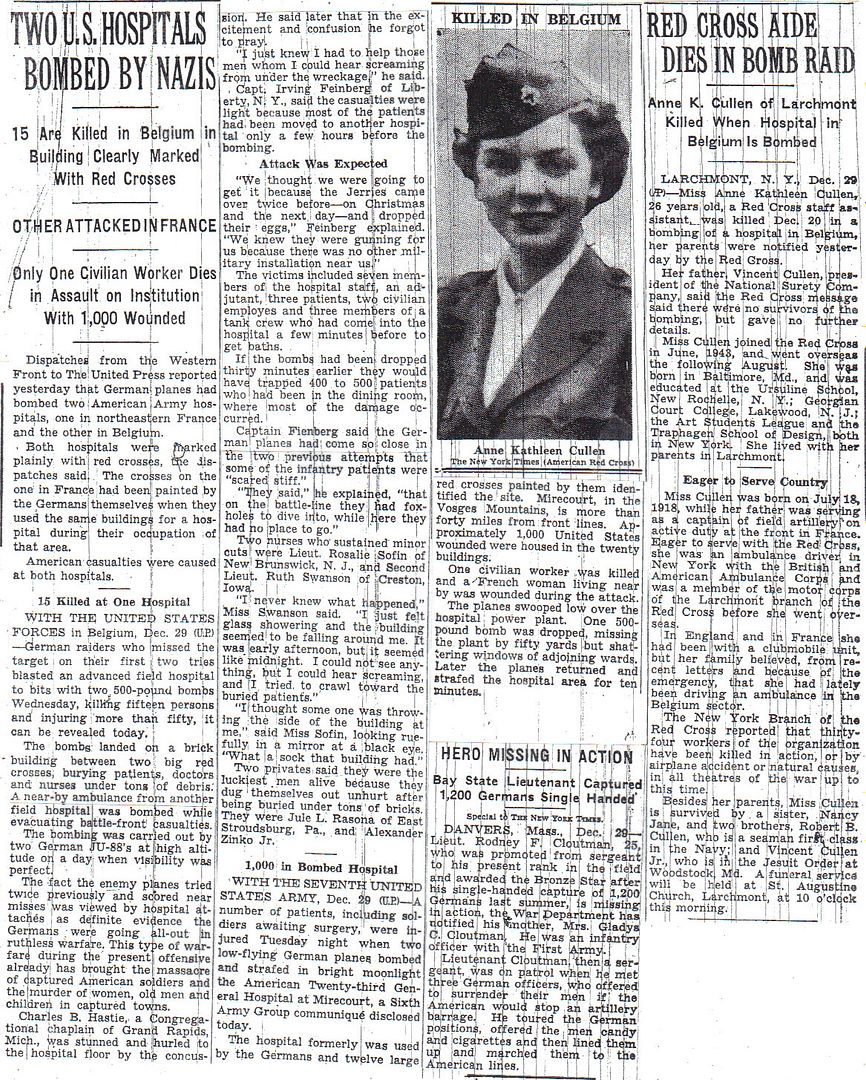
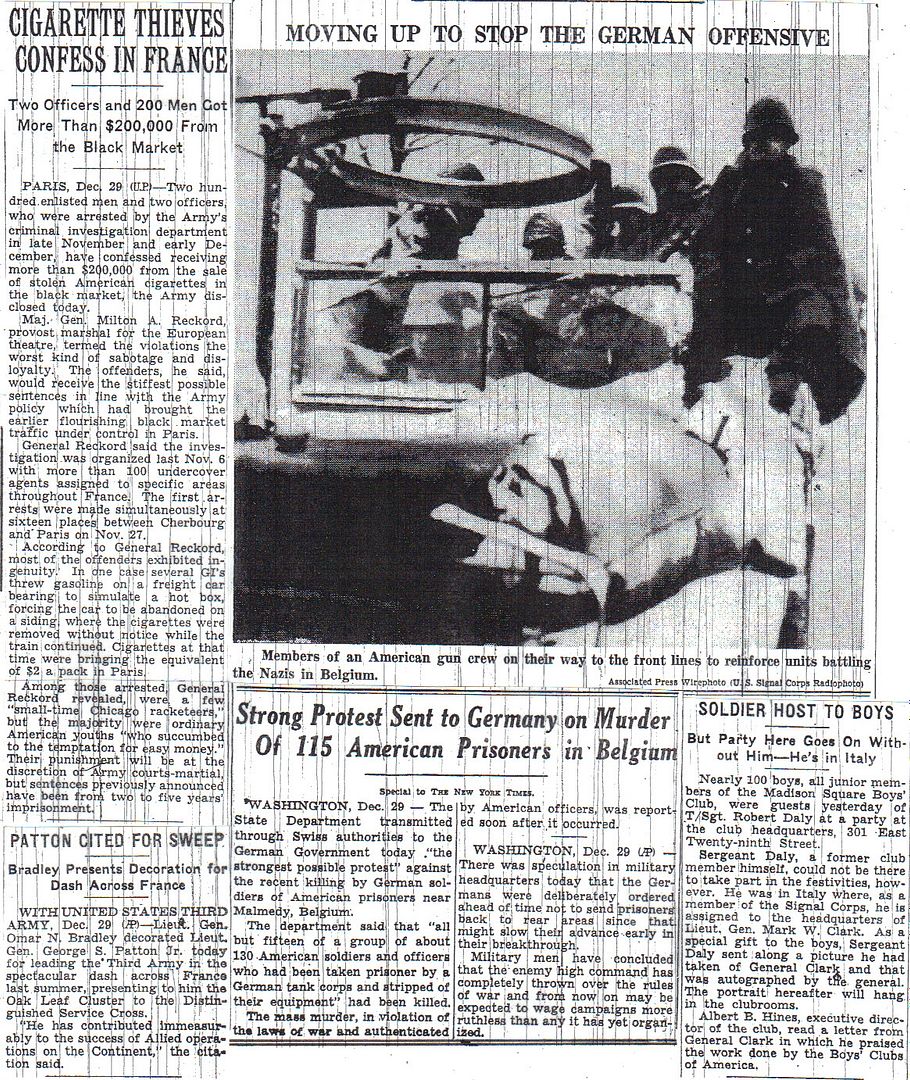
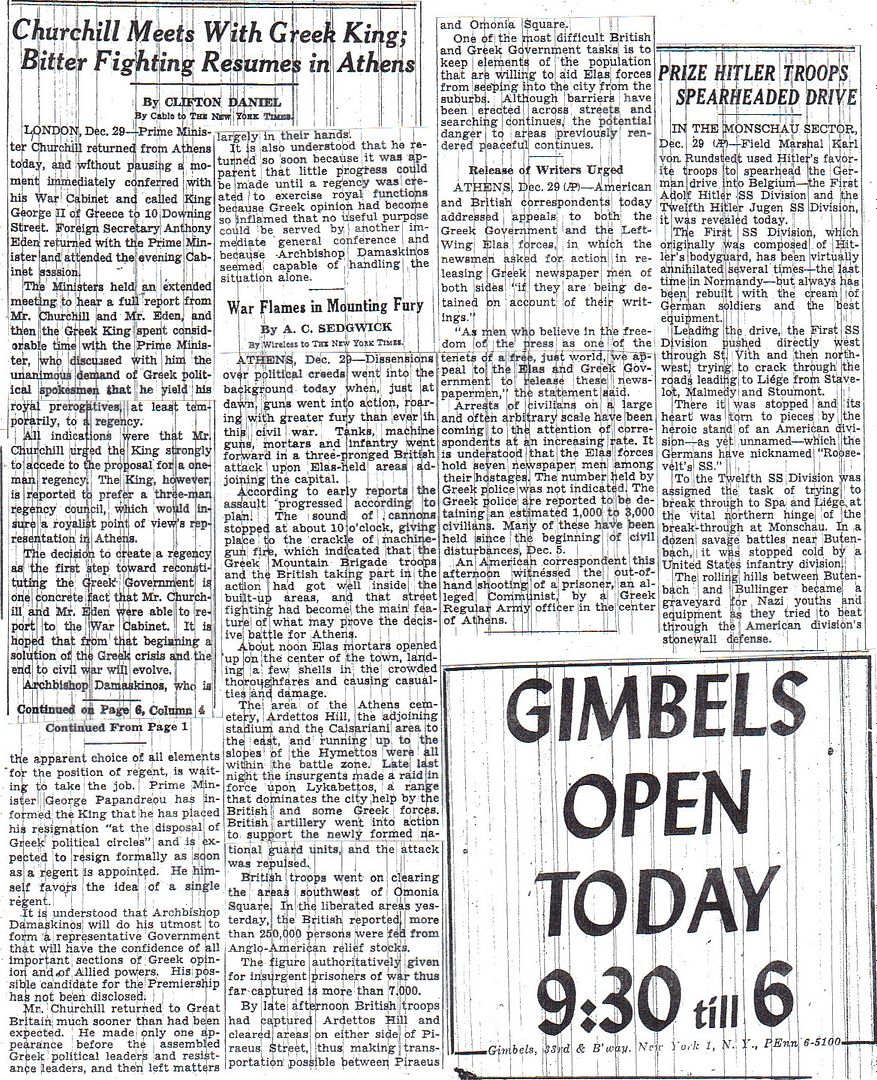
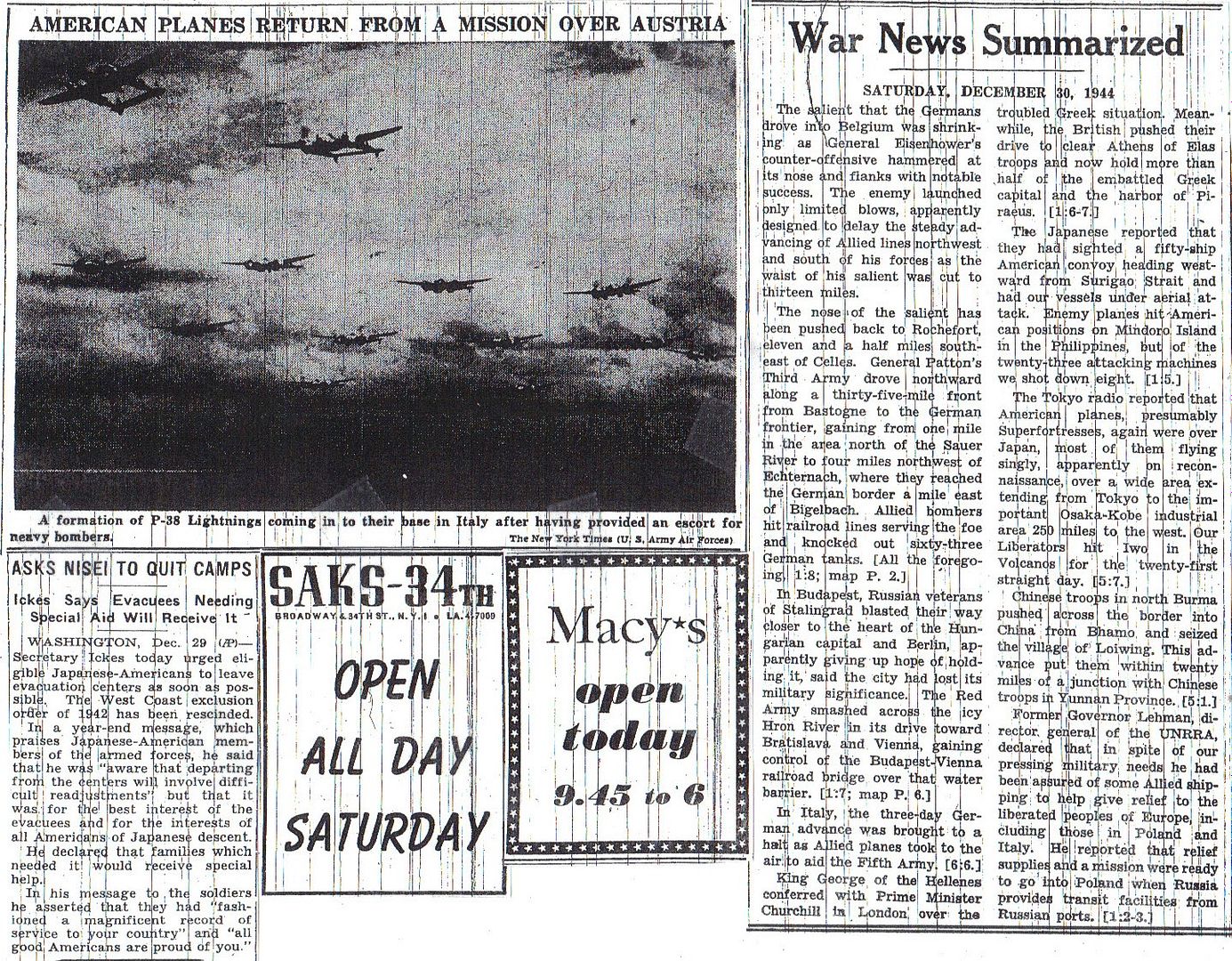
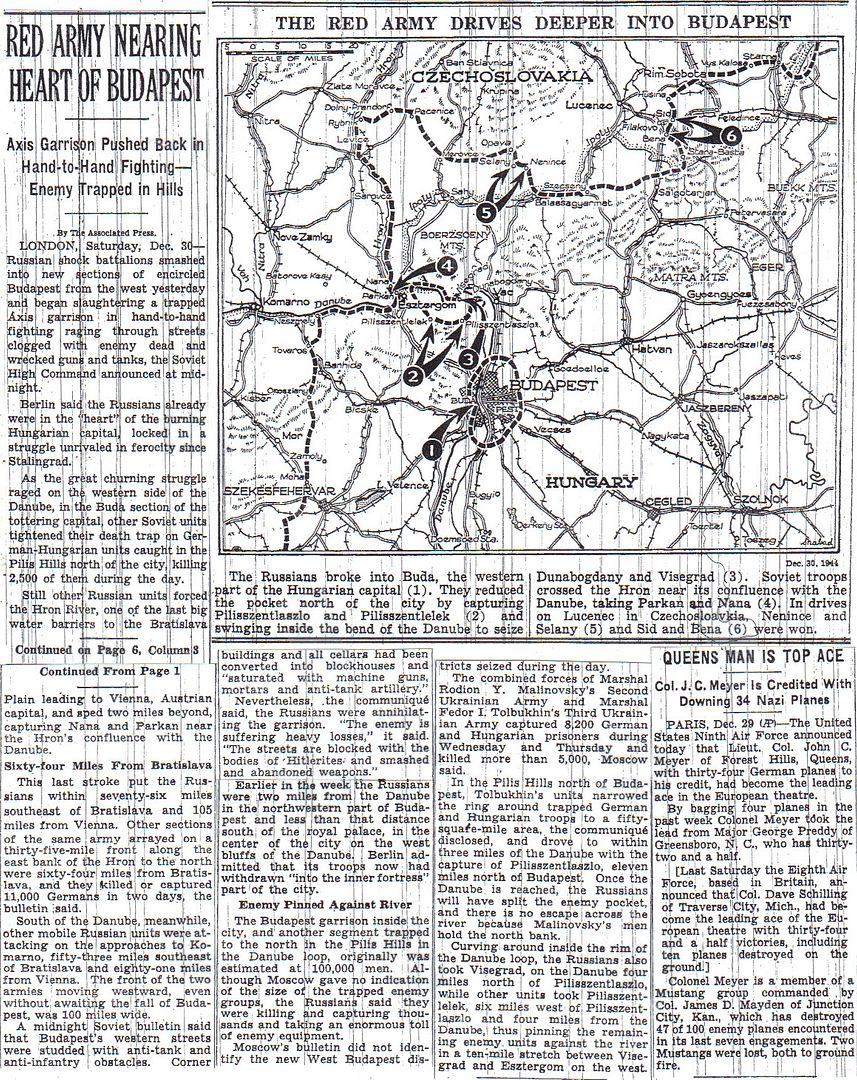
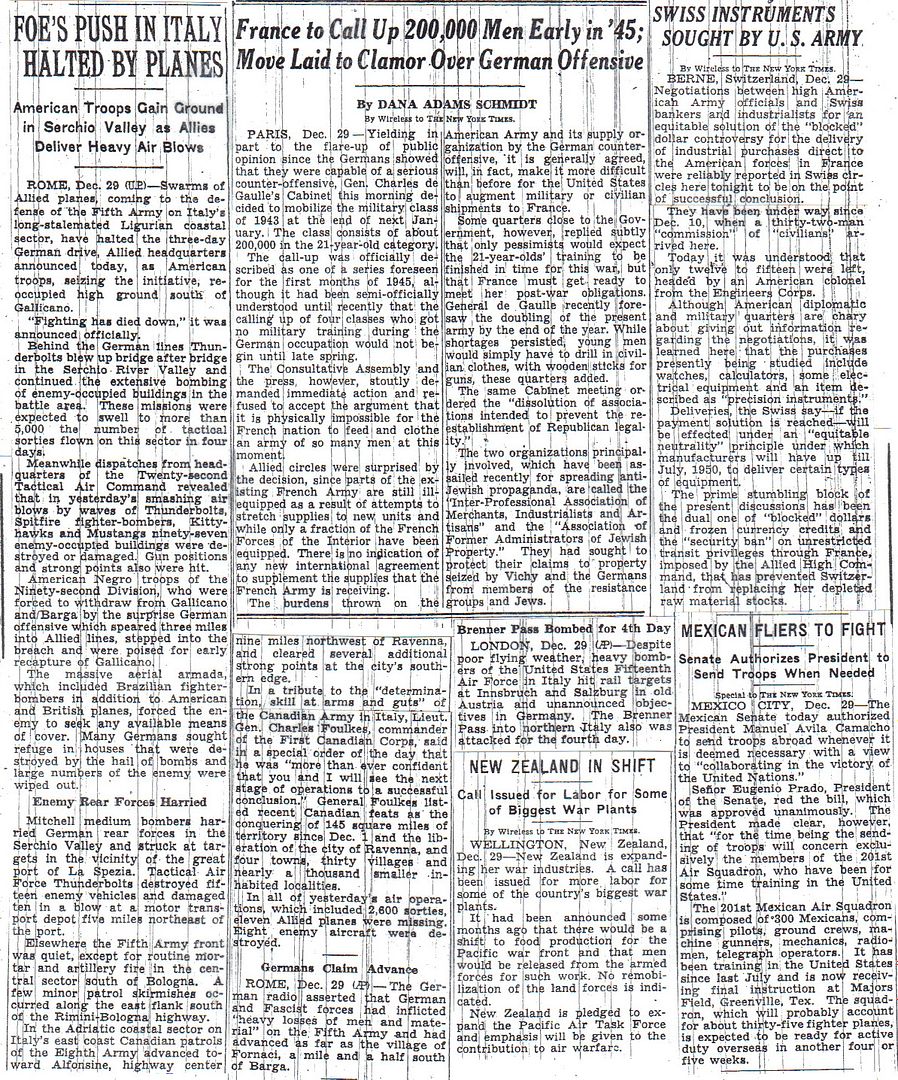
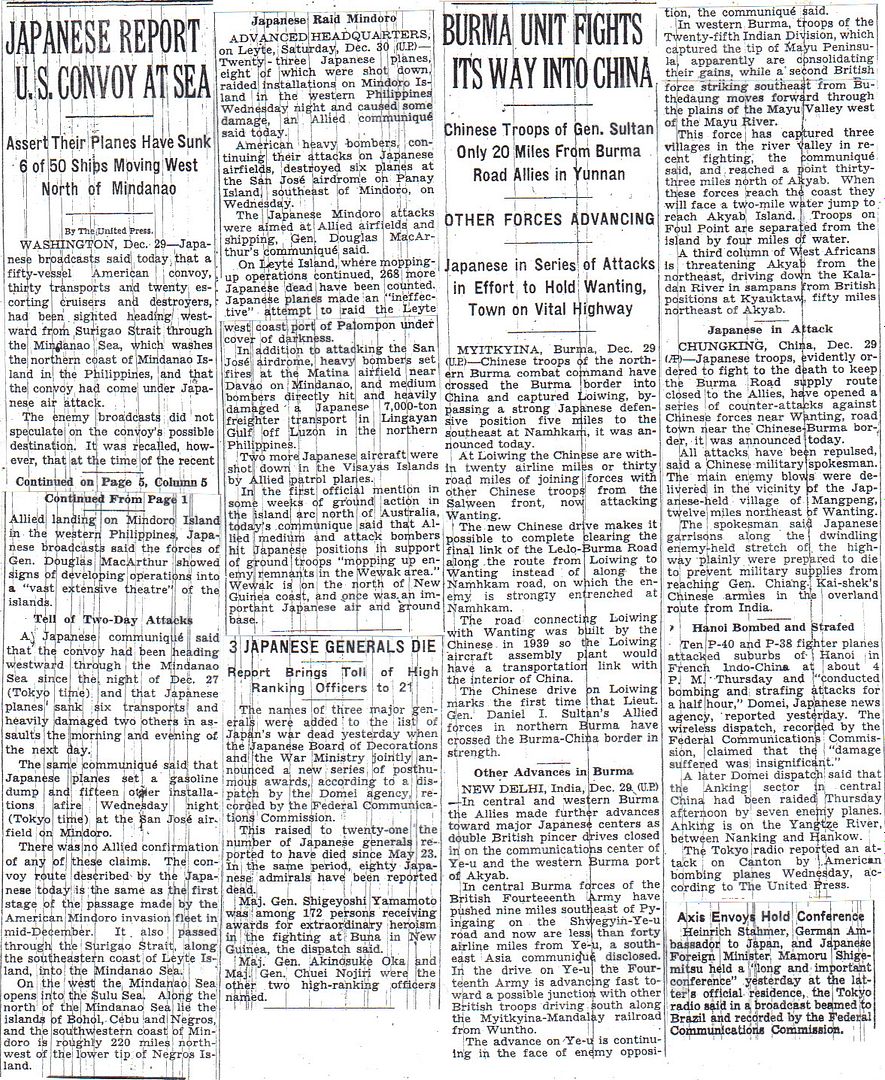
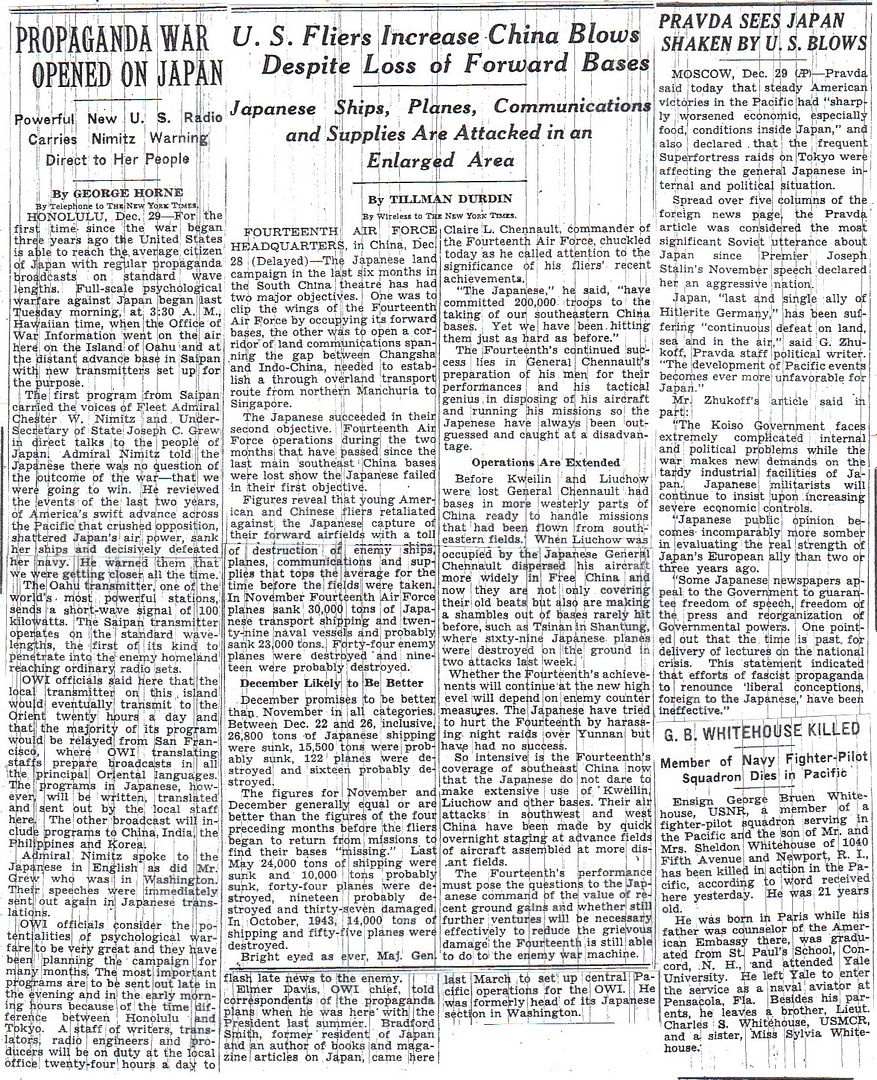
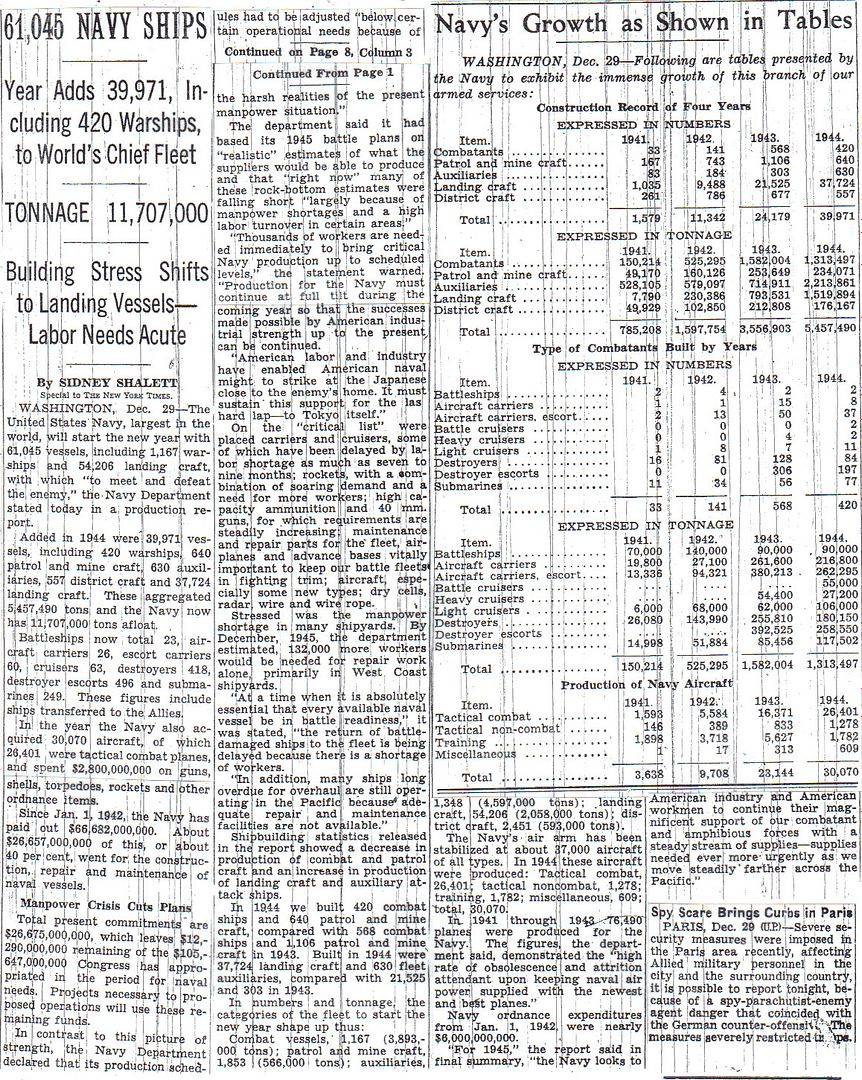
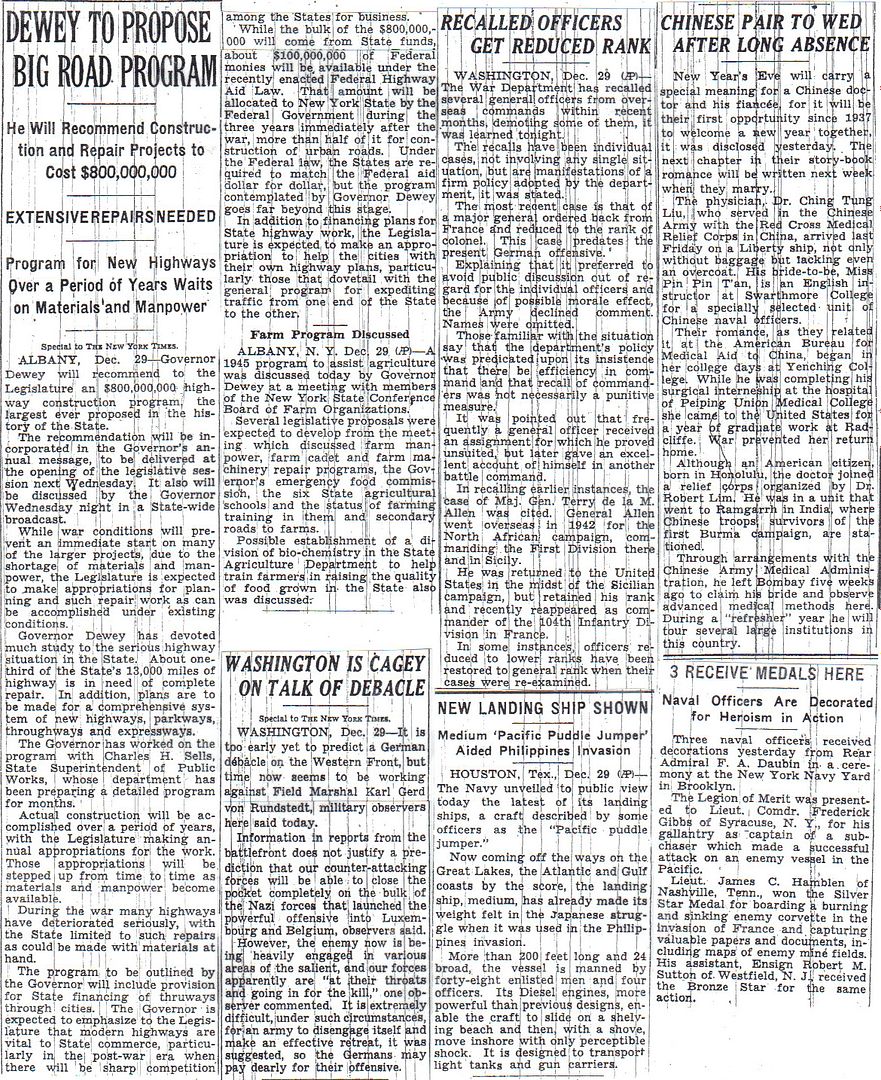
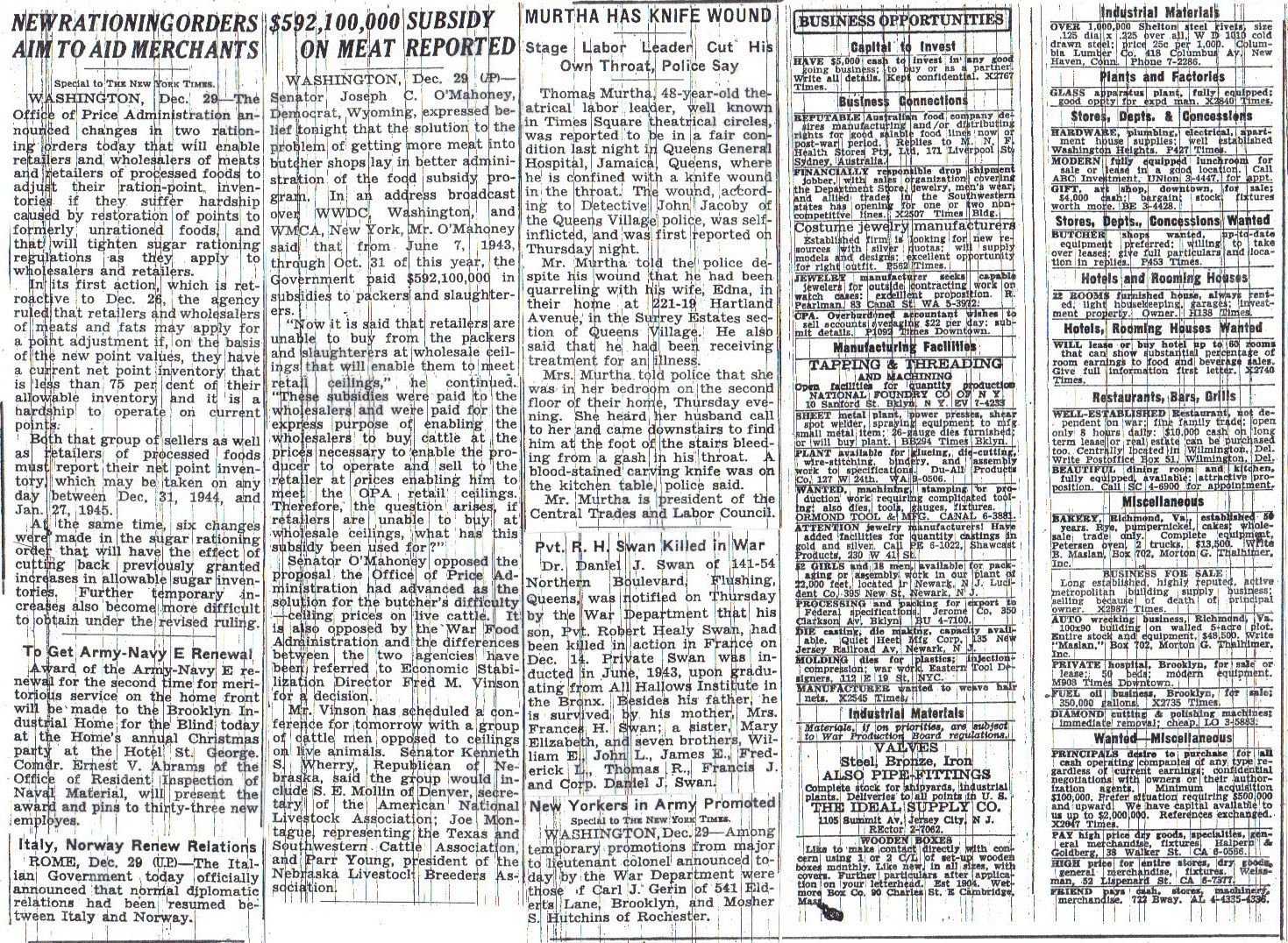
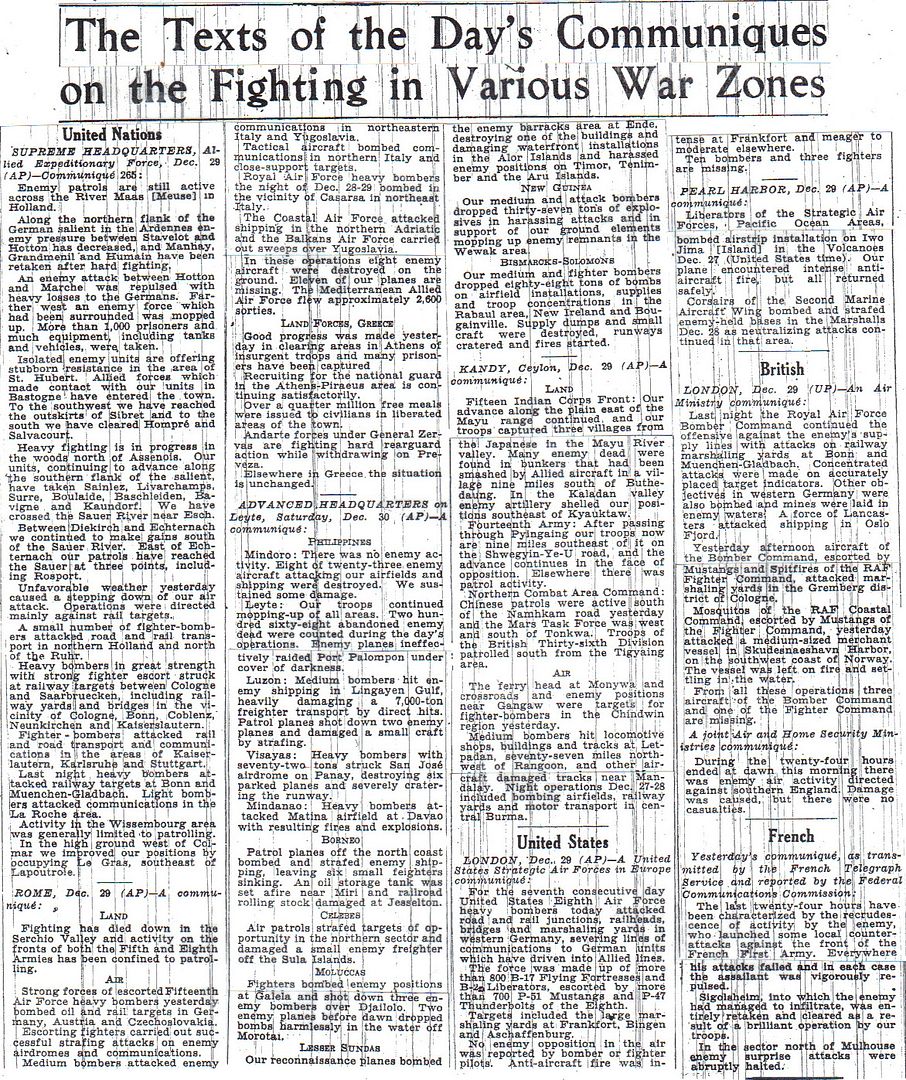
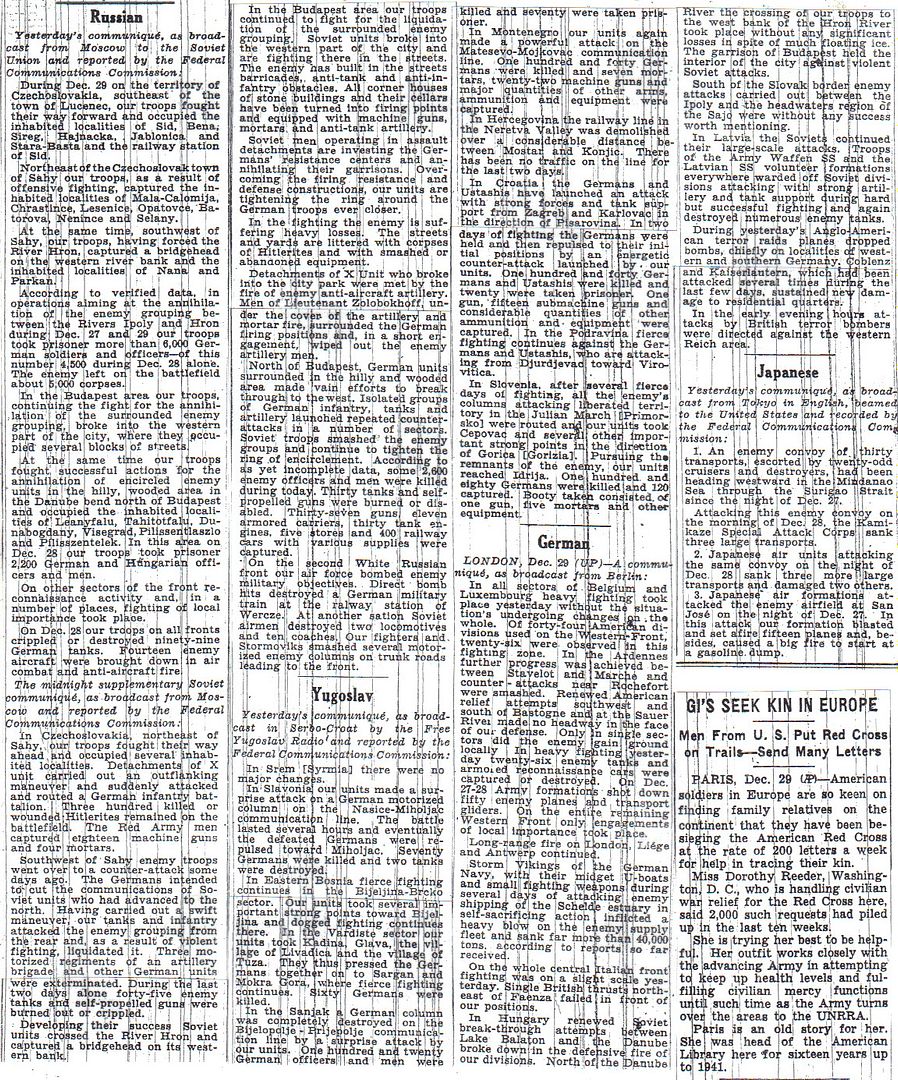
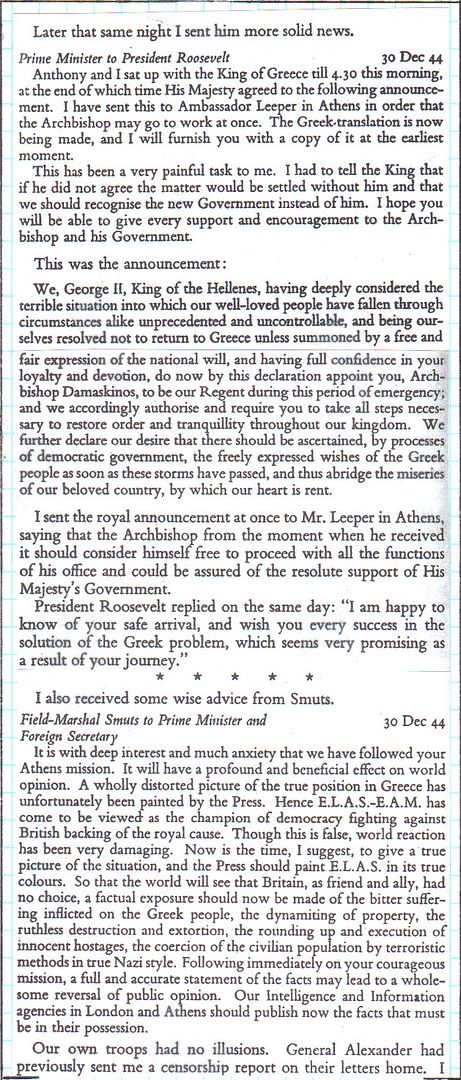
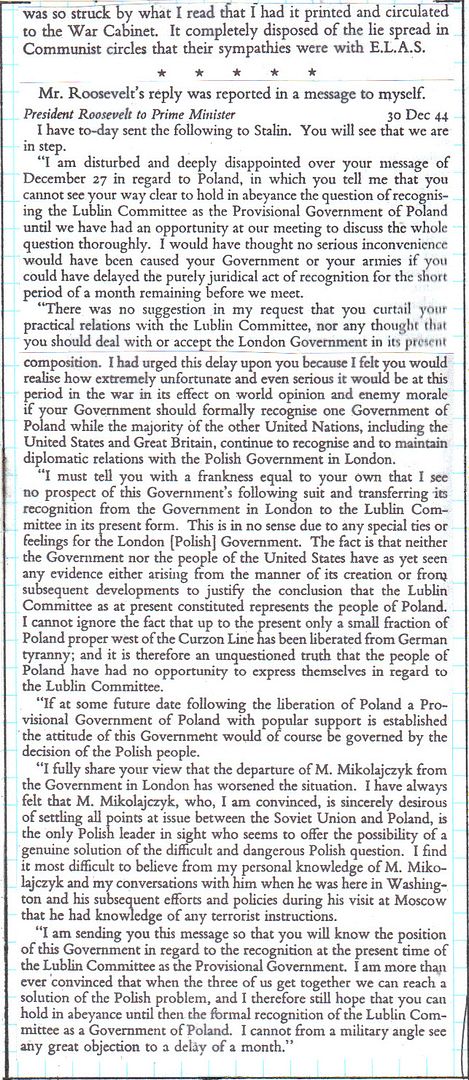
Winston S. Churchill, Triumph and Tragedy
#1 - “Don’t Fence Me In” – Bing Crosby, with the Andrews Sisters
#2 – “I’m Making Believe” – Ink Spots, with Ella Fitzgerald
#3 – “The Trolley Song” – Pied Pipers
#4 - “The Trolley Song” – Judy Garland
#5 – “I Dream of You” - Andy Russell
#6 - “White Christmas” - Bing Crosby
#7 - “White Christmas” – Frank Sinatra
#8 - “Too-Ra-Loo-Ra-Loo-Ral” - Bing Crosby
#9 – “I’ll Walk Alone” – Martha Tilton
#10 - “And Her Tears Flowed Like Wine” – Stan Kenton, with Anita O’Day
http://www.etherit.co.uk/month/11/30.htm
December 30th, 1944 (SATURDAY)
UNITED KINGDOM: Destroyers HMCS Sioux and Algonquin departed Loch Ewe with Convoy JW-63 for Kola Inlet.
Submarine HMS Tapir commissioned.
King George II of Greece proclaimed a regency to rule his country, virtually renouncing the throne.
WESTERN EUROPE: The USAAF Eighth Air Force flies Mission 771: eight B-24 Liberators and three B-17 Flying Fortresses drop leaflet in the Netherlands, Luxembourg and Germany during the night. Weather forces the recall and cancellation of the USAAF Ninth Air Force’s 9th Bombardment Division and IX Tactical Air Command missions; the XXIX Tactical Air Command (Provisional) flies armed reconnaissance over the battle area and around Wallersheim, Germany and the XIX Tactical Air Command covers large areas of France, Belgium, and Germany hitting numerous ground targets and supports the U.S. III, VIII, and XII Corps in the Saint-Hubert and Bastogne, Belgium and the Diekirch, Luxembourg areas.
ENGLISH CHANNEL: U-772 sunk south of Weymouth, in position 50.05N, 02.31W, about 65 nautical miles (120 kilometres) southwest of Southampton, by depth charges from an 407 Sqn RCAF Wellington Mk. XIV, based at Chivenor, Devon. 48 dead (all hands lost).
BELGIUM/LUXEMBOURG: The VIII Corps, from the US 3rd Army, begins an attack north toward Houffalize from near Bastogne.
In Antwerp at 1045 hours, a German A4 (V-2) rocket crashes in Mortsel near the Castle of Cantecroy causing five injuries and one house destroyed. At 1321 hours, another A4 lands at Borgerhout in Wynegemstraat-Florastraat resulting in 44 deaths, 125 injuries and 110 houses destroyed.
In U.S. First Army’s VII Corps area, the corps turns over the region southwest of the line Marche-Namur to the British. The Germans abandon Rochefort.
In the U.S. Third Army area, VIII Corps opens a drive on Houffalize. The 11th Armored Division progresses slowly and at heavy cost. The 87th Infantry Division takes Moircy but loses it in a counterattack later in day. In the III Corps area, Germans again attempt to cut the Arlon-Bastogne highway and isolate Bastogne, reaching Lutrebois and surrounding two companies of the 137th Infantry Regiment, 35th Infantry Division, in Villers-la-Bonne-Eau.
During the night of 30/31 December, RAF Bomber Command sends 154 Lancasters and 12 Mosquitos to attack a German supply bottleneck in a narrow valley at Houffalize; 97 aircraft attack the target. The results of the raid are not known. One Lancaster crashed in France.
NETHERLANDS: During the day, RAF Bomber Command sends 13 Lancasters to bomb the U-boat pens at Ijmuiden but the raid was abandoned because of bad weather.
FRANCE: Alsace. The U.S. 6th Army Group located South of the Ardennes, including 7th Army, VI Corps was preparing to give ground if the German’s mounted a major attack to avoid being cut off like U.S. forces in the Ardennes.
Ike had ordered General Devers to retreat to the Vosges Mountains, if necessary, to prevent a break through. General De Gaulle was insisting that Strasburg not be allowed to fall into German control since Strasburg was as important to the French people as Paris. Ike was also having problems with British General Montgomery over who should be the overall ground commander in Northern Europe, and fighting was still furious in the Ardennes.
VI Corps, 7TH U.S. Army had received information the day before (Dec 29th) that a hostile attack against the flank might force giving up ground. Everyone was nervous from reports of German paratroops landing in the rear plus German infiltrators dressed in U.S. uniforms, driving U.S. jeeps and speaking fluent English. Security check points and guards were posted at all road intersections and unit local security posts were increased. The day before (Dec 29th). At unit levels, verbal signs and countersigns were changed frequently.
Scattered firing occurred among the new replacements and new inexperienced units who were seeing Germans behind every tree. No one seemed to know who was firing at whom.
Hitler’s direction for “Operation Nordwind” included destruction of American and French man power and equipment, and for the German Nineteenth Army (about 100,000 men) that had been cut off to the South in the Colmar Pocket to break out and join the attacks from the North. (Joe Brott)
De Guingand arrives at SHAEF after a hair raising, bad weather flight from Brussels. He meets with Eisenhower, Tedder and Smith and asks that Eisenhower’s letter to the Combined Chiefs about the situation with Montgomery be held for 24 hours. He feels that Montgomery does not understand the resentment that his letter of the previous day to Eisenhower has caused. He feels that if he has time to explain the situation to his master that Montgomery will back down. Eisenhower and Tedder feel that the damage had already been done but Smith takes sides with de Guingand. Ike relents and agrees to hold the letter for 24 hours. Back in Smith’s office de Guingand sends a message to Montgomery that he wants to meet with him in Zonhoven, Monty’s advance CP, so as to discuss an important matter with him on the next day.
GERMANY: U-2351, U-2530 commissioned.
The USAAF (Eighth Air Force flies Mission 770: 1,315 bombers and 572 fighters are sent to attack rail and communications targets in western Germany; four bombers and two fighters are lost. The targets are (numbers in parenthesis indicate number of aircraft bombing and number lost, e.g., 97-1):
- Marshalling yards at: Kassel (319-1), Mannheim (189-2), Kaiserslautern (145-0), Mechernich (87-0), Mainz (45-0) and Bischofheim (34-1).
- Railroad bridges at: Euskirchen (92-0), Kaiserslautern(72-0), Bullay (71-0), Altenahr (61-0), Neuweid (58-0), Remagen (Ludendorf Bridge) (29-0) and Stadtkyll (28-0).
- Other: 25 bombers hit the city of Kassel and 10 bomb targets of opportunity.
During the night of 30/31 December, RAF Bomber Command dispatches 470 aircraft,
356 Halifaxes, 93 Lancasters and 21 Mosquitos, to attack the area in which the Kalk-Nord railway yards are situated in Cologne; 457 aircraft attack with the loss of a Halifax and a Lancaster. The presence of cloud causes difficulties for the Pathfinders and the outcome of the raid could not be observed but the local report shows that the Kalk-Nord yards, as well as the two passenger stations near by, are severely damaged. At least two ammunition trains blow up and nearby Autobahns are also badly damaged, all adding to the effect upon the German transportation system. In other raids, Mosquitos attack four cities: 68 hit Hannover, nine bomb Bochum (five hit the Gelsenkirchener coal mine, three attack the Carolinengluck coking plant and one bombs the city); eight attack Duisburg and one bombs Bonn.
HUNGARY: Russian units of the 2nd and 3rd Ukraine Fronts are involved in the ongoing fighting in and around Budapest.
FINLAND: An Allied Supervision Commission, headed by the Russians, informs Finnish Air Force HQ that formations of up to ten US Douglas C-47 Skytrain transports will be flying several missions from Kallax in northern Sweden across Lapland to Kirkenes and back. The Finns are expected to provide safe transit across Finland. (Gordon Angus Mackinlay)(153)
ITALY: USAAF Twelfth Air Force medium bombers concentrate a major effort on rail line running north to the Brenner Pass, hitting a fill at Dolce and bridges at Calliano, Ala, and Santa Margherita d’Adige, and ammunition dump at Bologna. Fighter-bombers blast road bridges, support the U.S. Fifth Army southeast of La Spezia, and hit bridges in the Mantua and Modena areas. During the night of 30/31 December, A-20 Havocs again fly intruder missions, bombing a variety of targets, including motor transport, bridges, and railroads in the Po Valley.
GREECE: On 25 December, an agreement was reached which led to the establishment of a regency government under Archbishop Damaskinos Papandreou, the archbishop of Athens. Greek King George II, living in exile in the U.K., appointed the archbishop as the head of the caretaker government, and Archbishop Damaskinos is sworn in as regent today and appoints himself Prime Minister. He relinquishes his position after the civil war begins to die down and recalls the king formally on 28 September 1946.
ARCTIC OCEAN: U-956 sank Soviet Liberty Ship Tibilisi II (ex-American John Langdon) 69.56N, 32.29E - Grid AC 8812.
JAPAN: The first I-400 aircraft carrying submarine is completed. (Phil Jacobsen)
CHINA: Four USAAF Fourteenth Air Force B-24 Liberators damage a bridge west of Kengtung. P-51 Mustangs and P-40s on armed reconnaissance attack targets of opportunity at several points including areas around Ka-chun, Shanhsien, Ichang, and Shayang.
BURMA: In the British Fourteenth Army area, the XXXIII Corps takes Kaduma.
Twelve USAAF Tenth Air Force P-47 Thunderbolts knock out and damage bridges at Man Pwe, Ho-hko (two bridges), and Inailong; 17 B-25 Mitchells blast a troop and supply area at Kyatpyin; and 28 P-47s and P-38 Lightnings hit troops, supplies, and areas of enemy activity at Myethin, Manna, Nanponpon, Lawa, Sabenago, Hmattawmu, and Hosi. Four B-25s continue a single-plane offensive reconnaissance over communications lines during the night of 30/31 December.
USAAF Fourteenth Air Force P-51 Mustangs and P-40s on armed reconnaissance attack targets of opportunity at several points including areas around Mong Nawng, Man Pong, and Mong Long.
VOLCANO ISLANDS: Fourteen USAAF Seventh Air Force Saipan-based B-24 Liberators bomb Iwo Jima which is hit again over an almost 7-hour period during the night of 30/31 December by nine B-24 Liberators singly operating from Guam.
FRENCH INDOCHINA: Two USAAF Fourteenth Air Force B-24 Liberators damage a bridge, railroad tracks, and 40+ boxcars northeast of Thanh Moi.
COMMONWEALTH OF THE PHILIPPINES: Coast Guard-manned FS-367 takes on survivors from USS Mariposa at San Jose, Mindoro.
Aircraft carriers USS Enterprise and Independence left Ulithi anchorage to fight with Japanese night bombers in the Philippines area. Both carriers had aircraft equipped with radars (night versions of F6F Hellcat fighters and TBM torpedo bombers).
In the U.S. Eighth Army’s X Corps area on Leyte Island, the 1st Cavalry Division makes contact with the 32d Infantry Division northeast of Villaba. In the XXIV Corps area, the 77th Infantry Division begins two-pronged attacks to open the Palompon road. While the 3d Battalion, 305th Infantry Regiment, 77th Infantry Division, continues west to a point some 1,000 yards (914 meters) southwest of Tipolo, the Provisional Mountain Force attacks east until stopped about 4 miles (6,4 kilometres) east of Palompon. The Japanese withdraw their main forces, during the night of 30/31 December. Company C, 305th Infantry Regiment, moves by water to Abiao, north of Palompon, and burns the town; continuing north, they gain radio contact with 1st Cavalry Division in the Villaba area.
On Mindoro Island, the second resupply convoy arrives. Under Japanese air attack while en route, the convoy loses three merchant ships, two destroyers, three tank landing ships (LSTs), and a landing craft, mechanized (LCM) at or near the island. Most of the 3d Battalion, 21st Infantry Regiment, 24th Infantry Division, arrives.
In the principal action of the day, USAAF Far East Air Forces fighter-bombers attack airfields in the central Philippines. Smaller strikes by B-25 Mitchells, B-24 Liberators, and fighter-bombers are flown against shipping, and targets of opportunity throughout the Philippine Islands.
EAST INDIES: USAAF Far East Air Forces fighter-bombers attack airfields on northern Borneo and northern and south-western Celebes Island while B-25 Mitchells hit a barge anchorage and supplies at Haroekoe Island. Smaller strikes by B-25 Mitchells, B-24 Liberators, and fighter-bombers are flown against shipping, oil targets, airfields, and targets of opportunity throughout the Netherlands East Indies.
SOLOMON ISLANDS: On Bougainville, Australians of the 25th Battalion, 7th Brigade, 3rd Division, occupy Pearl Ridge. The capture of the heavily defended Japanese position on the Pearl Ridge give the Australians possession of this important vantage point that provided views over both sides of the island.
PACIFIC OCEAN: Japanese air attacks continue on Mindoro, Philippine Islands-bound convoy; kamikazes damage destroyers USS Pringle (DD-477) and Gansevoort (DD-608); motor torpedo boat tender USS Orestes (AGP-10); and auxiliary USS Porcupine (IX-126). USS Porcupine is ultimately scuttled by USS Gansevoort. A merchant freighter is sunk by bombs off Mindoro Island and a merchant freighter is damaged when a kamikaze is shot down by a U.S. fighter and explodes over the ship.
CANADA: HMC MTB 797 commissioned. Log - 65th Flotilla, “D” Type, 102 tons, 115x21.25x5.25ft, 29kts, crew 4/28, 2-6pdrs, 2-20mm(1xII), 2-18in TT.
U.S.A.: Los Alamos, New MEXICO: Nuclear scientists working on the Manhattan Project estimate that the first atomic bombs will be ready by the end of July 1945.
Destroyer USS John R Pierce commissioned.
Minesweeper USS Inaugural commissioned.
Escort carrier USS Block Island commissioned (CVE-106).
Submarines USS Cabezon, Dentuda and Lizardfish commissioned.
The USN alters its aircraft paint schemes for landplane patrol aircraft. The upper and lower surfaces of the wings and the horizontal tail surfaces will be painted in semi-gloss sea blue and the fuselage and vertical surfaces will be painted flat sea blue.
From Atkinson’s The Guns at Last Light
The supreme commander’s patience finally snapped when the agreeable De Guingand arrived in Versailles on Saturday, December 30, with the disagreeable news that no offensive would be launched from the north until at least January 3, leaving Patton to fight alone in the south against a ferociously reinforced enemy. Convinced that he had been deceived, Eisenhower stormed about his office, ordering staff to find the message confirming Montgomery’s commitment to a January 1 attack – a futile search, De Guingand assured him, because “knowing Montgomery, the last thing he would do is commit himself on paper.”
“All right Beetle,” Eisenhower said, turning to his chief of staff as the familiar scarlet flush crept up on his neck. “I’m going to send a telegram…to the Joint Chiefs of Staff that I’ve had trouble with this man and it’s either the can relieve me if they’d like to – that would be perfectly all right – but one of us has to go.”
Now fully alive to Montgomery’s peril, and aware both of Marshall’s stern note and the thinly concealed American yen to have Harold Alexander command 21st Army Group, De Guingand proposed driving immediately to Zonhoven. “Won’t you please hold up that telegram ‘til I get back? He asked Eisenhower.
“All right, Freddie, I’ll hold this up until tomorrow morning. But I don’t think you ought to try and get up there, not tonight, because the weather is so bad.”
After De Guingand hurried out to begin the treacherous two-hundred-mile drive to Montgomery’s camp, Eisenhower dictated a frosty cable to the field marshal:
“I do not agree that one army group commander should fight his own battle and give orders to another army group commander…. You disturb me by predictions of ‘failure’ unless your exact opinion in the matter of giving you command over Bradley are met in detail. I assure you that in this matter I can go no further…. We would have to present our differences to the CC/S [Combined Chiefs of Staff].
Already in fragile health, De Guingand arrived in Zonhoven at midnight, as Alan Moorehead later told Forrest Pogue, “nearly exhausted, a little hysterical, full of whiskey….He said to Monty, ‘I must see you at once.” As the chief of staff described the surly mood in Versailles, Montgomery paced around his caravan.
“If you keep on, one of you will have to go,” De Guingand said, “and it won’t be Ike.”
Montgomery scoffed. “Who would replace me?”
“That’s already been worked out,” De Guingand said. “They want Alex.”
Montgomery’s bluster abruptly dissolved, precisely as it had when the battle of Mareth turned against him in March 1943. “What shall I do Freddie?” he asked. “What shall I do?”
De Guingand had already drafted an apology to Eisenhower, which he now pulled from his battle dress. “Sign this,” he said. Montgomery scratched his signature and summoned an orderly to have the message delivered, eye only:
Dear Ike….Whatever you decision may be you can rely on me one hundred percent to make it work and I know Bradley will do the same. Very distressed that my letter may have upset you and I would ask you to tear it up. Your very devoted subordinate, Monty.
The crisis past but the scars would linger. Soon after sending his apologetic note to Eisenhower, Montgomery privately cabled Brooke, “The general tendency at SHAEF and among the American command is one of considerable optimism….I cannot share this optimism.” Eisenhower thanked for “your very fine telegram,” but the incessant friction with the field marshal kept him awake at night. “He’s a little man,” he would say after the war. “He’s as little inside as he is outside.”
From Atkinson’s The Guns at Last Light
(Some of this goes back a few days, and some ahead a few days)
No sooner had Eisenhower suppressed this insurrection on his northern flank than his southern flank erupted, first with insubordination by 6th Army Group, then in a German attack hardly less cheeky than HERBSTNEBEL.
Although he commander ten French and eight American divisions, General Devers had accomplished little in Alsace since Eisenhower’s refusal in late November to permit the Rhine crossing near Strasbourg. The U.S. Seventh Army’s combat power had been dissipated by the requirements to move in two opposite directions: north to shore up Bradley’s flank, and south, to help General de Lattre eradicate enemy salient around Colmar. Neither gambit yielded conspicuous success. After punching half a dozen holes through German border to the north, GIs found the Siegfried Line impenetrable; they were reduced to tacking up latrine placards along the West Wall that read, “Shit on Hitler’s Home.”
The Colmar pocket, as wide as the Bulge in Belgium and about half as deep, also proved unyielding. General Dahlquist’s 36th Division, attached to DE Lattre’s First Army, reported that their French brother-in-arms showed little interest in completing the liberation of Alsace, even as German forces aggressively shored up the salient. “The enemy attacked on three fronts today,” Dahlquist told his diary in mid-December, late adding, “The French left our division holding the bag for almost two weeks.” Squabbling between rival French factions persisted, aggravated by General Leclerc’s declaration that neither he nor his 2nd Armored Division cared to serve under a Vichy traitor like De Lattre. “I have now two problems children, Leclerc and De Lattre,” Devers wrote George Marshall.
At Verdun on December 19, Eisenhower had ordered 6th Army Group to help Bradley in the Bulge by contributing troops and shifting to the defensive. Three days later, Devers halted further attacks against the Colmar Pocket, leaving Hitler still master of 850 square miles of France. But Eisenhower was willing to concede much more: a SHAEF staff officer on December 26 brought Devers a map drawn by the supreme commander personally, which made plain that the Franco-American armies were to fall back nearly forty miles to an ostensibly more defensible line along the Vosges, abandoning Strasbourg and the Alsatian plain. Devers on December 27 flew to Versailles to argue that a retreat from the Rhine would anger the French, embolden the Germans, and bring the hard-won Saverne Gap within range of enemy artillery. Eisenhower stood fast, spooked by intelligence reports of German legions massing across the U.S. Seventh Army. The 6th Army Group, he told Devers, must move ‘back to the Vosges line and hang on” until the Ardennes struggle subsided. Supply dumps were to be shifted into the mountains, and Devers was to sequester two U.S. division, one armored, one infantry, as a SHAEF reserve west of the Vosges. Devers told his diary:
The Germans undoubtedly will attack me now….The position I give up is much stronger that the one to which I go….Giving up the town of Strasbourg is a political disaster for France.
De Galle thought so too: on December 28, he sent General Alphonse Juin, now the French military chief of staff, to Versailles to make inquiries about a rumored retreat in Alsace. A gallant Algerian, distinguished by his Basque beret and left-handed salute – his right arms had been maimed in 1915 – Juin corned Beetle Smith who told him that no firm decision had been made and that SHAEF’s action was “simply the study of a plan.” In truth, Smith had drafted the final order that morning. Juin motored back to Rue St.-Dominque and warned De Gaulle, “They are up to something.”
While Smith prevaricated, Devers temporized. He moved his command post seventy miles west, to Vittel, but ordered his staff to prepare plans for three intermediate fallback positions leading to a final line along the eastern face of the Vosges. When General Patch was told to ready his Seventh Army for withdrawal, he winked at a staff officer and said, “Ain’t going to do it. We aren’t the bad off.”
De Lattre was even more recalcitrant, decrying “a psychosis of retreat” that would force the Allies to capture the same ground twice. He took two days to translate Dever’s withdrawal directive into his own General Orders No. 201, which on December 30 instructed French subordinates “to maintain the integrity of the present front” by yielding not a single square centimeters of Alsatian soil. Devers cabled Eisenhower that falling back to the Vosges could take two weeks.
Once again the supreme commander’s neck flushed a deep red. “Call up Devers and tell him he is not doing what he was told,” he barked at Smith. “Tell him to obey his orders and shorten his line.” In a phone call from Vittel, Devers feebly claimed that Eisenhower’s earlier instructions had been discretionary. “I won’t go to him with that story,” Smith snapped. “He thinks you’ve been disloyal.” Another written order from Eisenhower left no wiggle room:
“The political pressure to retain French soil, which you are undoubtedly experiencing, must be resisted if it leads to any risk of your losing your divisions….You must not endanger the integrity of your units east of your main position, the Vosges. You must be prepared to accept the loss of territory east of the Vosges and all its political consequences.”
Devers capitulated, telling subordinates that all forces would have to retreat to the Vosges no later than January 5. “Eisenhower,” he advised his diary, “has given me no alternative.” As for the supreme commander, he was now so vexed at a man whom he had long disliked that he considered sacking Devers and giving command of his army group to Patch.
“You can kill a willing horse by overdoing what you require of him,” Devers wrote in his diary. “SHAEF has given me too much front, and taken away too many of my troops. This is unsound.” A message from De Gaulle through Juin urged the Allies not to surrender Strasbourg “but to make it a Stalingrad.”
The final day of the year ticked by with fresh snow and more omens. A reconnaissance flight at last light detected German artillery lumbering forward into new gun pits. Seventh Army placed all troops on high alert and canceled holiday celebrations. A reporter who insisted on toasting the departure of 1944 declared, “Never was the world plagued by such a year less worth remembering.” Dever’s diary entry for December 31 was just as cheerless: “Patch called me…. He was sure he was going to be attacked during the night.”
Anita O’Day performing at Newport Jazz Festival.
https://www.youtube.com/watch?v=rRleR-e8_t8
December 1944 explains Ike’s heart problems during his Presidency.
Three packs a day might also have something to do with them.
Jazz fans looked like nerds in 1958. I guess everybody did.
Mr. niteowl77
In a way, that's Britain, and it seems to be the history of their commanders.
The first report of Malmedy.
My Dad told me after they read that it was basically “no prisoners” time during battle and afterward they only accepted prisoners if they had their own food.
Really amazing stuff. Thanks for sharing.
To me, Ike was a superior commander, dealing with so many obtuse personalities, egos, and political self-interests as well as his own anger at such. Monty wasn’t the only source of “friendly fire” he had to deal with.
p. 3: Identification and extolling of the divisions which checked and slowed the German onslaught
p. 4: Highlighting of McAuliffe's "Nuts" retort
p. 14: Report of 39,971 new ships added in 1944, which is 110 new ships per day. OK, so 94% were landing craft, but still. By the way, 37,724 landing craft? Japan, here we come!
In some ways it was easier to deal with the Russian part of the coalition. You knew they would keep killing Germans until they got to Berlin. Of course, they would take Eastern Europe on the way, but there was nothing we could do about that.
Monty was so obtuse. We had four field armies in Western Europe, the British one and the Canadians one. Roosevelt and Marshall would never have allowed Monty to command them.
HERO MISSING IN ACTION
Bay State Lieutenant Captured 1,200 Germans Single Handed.
Lt. Rodney F. Coloutman, 25..............single-handed capture of 1,200 germans...................
https://www.vetfriends.com/memorial/honoree.cfm?hindex=15879#.VKMPR2d0wfQ
Disclaimer: Opinions posted on Free Republic are those of the individual posters and do not necessarily represent the opinion of Free Republic or its management. All materials posted herein are protected by copyright law and the exemption for fair use of copyrighted works.